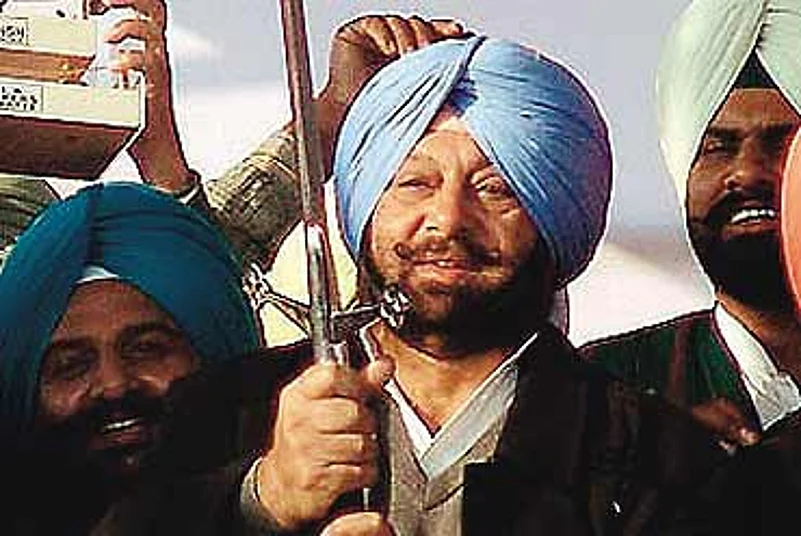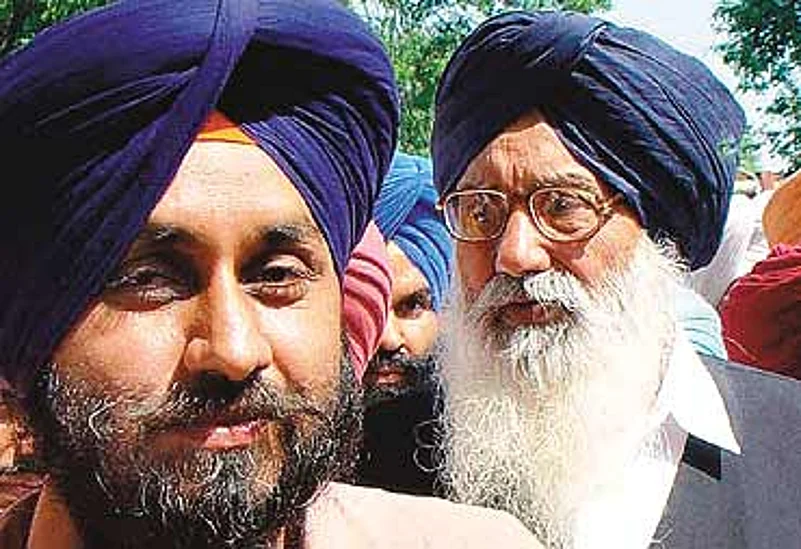It's a bitter sweet harvest for the Shiromani Akali Dal–BJP combine in Punjab.They’ve won alright, but victory in the assembly elections has come with a touch of bitterness.Victory for the Akalis comes with the realization that its support base in its traditional strongholds is fast eroding and that anti incumbency of a different kind can dog even leaders who have spent five years in the opposition. If there is any one message that comes across clearly from the verdict in Punjab,it is that long established roles and territory holds of political parties have reversed sides in this border state. And, though the smiles were in place in the Badal camp as they munched on ladoos, victory hasn’t been that sweet.
Advertisement
For one, even as alliance partner BJP won a record 19 seats, much of the SAD’s own top leadership stands decimated in the election. Chief minister designate PrakashSingh Badal too has won his Lambi seat with a modest margin of just about 9000 votes as against his rival and ousted chief minister Amarinder Singh who won from Patiala with about 32000 votes. And, almost all of this loss is from the SAD’s traditional stronghold of southern Punjab—the Malwa belt, where, from 27 seats in 2002, it is down to 23 seats whereas the Congress has added another 9 to its kitty from here.
Advertisement
The SAD has now emerged as a party of the Majha and Doaba areas of the state, conceding much of its traditional hold in Malwa to the Congress. Many of its top leaders like Balwinder Singh Bhunder, Bibi Jagir Kaur, Tota Singh and others lost because they neglected their constituencies while in the opposition. Also, if it weren’t for a resurgent BJP, the SAD could have been in trouble because the party has improved its own tally by just 7 seats from last time. All this was weighing heavily with the SAD leadership as did the victory lap, seeing many of its party stalwarts losing the election including charismatic former SGPC head Bibi Jagir Kaur who lost from Bholath.
This election has been all about role reversals, development and governance where, though Punjab’s well worn ‘panthic’ issues took a backseat with the Sikh peasantry, it has had its effect on the urban Hindus with devastating consequences for the Congress.

Consider this: Throughout his five year tenure Amarinder Singh wooed the rural Jat Sikh, projecting himself as the true protector of the Sikh panth. He not only organized the extravagant 400th anniversary of the installation of the Guru GranthSahib but got a bus route opened for pilgrims to Nankana Sahib, the birth place of Guru Nanak in Pakistan. Amarinder’s glittering ‘palki’ procession to Nankana Sahib where he took a gold palki to the Sikh shrine was also aimed at seizing the ‘panthic agenda’ from the Akalis. Though this did win him some good will from rural Punjab, it effectively alienated the urban Hindus who quietly shifted to the BJP. "It’s a subtle undercurrent of apprehension which has manifested itself in the BJP’s rich haul of 19 of the 23 seats contested by it," says Dr Pramod Kumar, a Chandigarh based analyst.
Advertisement
The very same urban Hindus who voted for the Congress in 2002 shifted with vengeance to the BJP fold, because the Congress under Amarinder Singh became known more for its pro sikh stance. Both he and PCC president Shamsher Singh Dullo are turbaned Sikhs. Of the record 76% turnout on polling day the voting by urban Punjab increased by 33%. The dalits too who have traditionally voted for the Congress were fragmented.
Sadly for the Congress, the nation’s first Sikh PM in Manmohan Singh too has proved to be more of a liability for it. The Congress’s rubbing in of Manmohan’s Sikh credentials for the last two years has clearly not gone down well with the urban Hindus who have sided with the BJP at a time when the latter does not have any leaders of note in Punjab. Manmohan Singh did not evoke much interest even among the Sikhs of Punjab and his two thinly attended rallies during the election campaign have been a source of much embarrassment for the Congress. "The man has not given anything substantial to Punjab even though he has visited the state several times after he became PM. We don’t feel as if he is one of us because he cannot even speak good Punjabi," said a disgusted Sohan Singh in Balachaur.
Advertisement

Amarinder’s undoing many say, is that he tried to steal into Akali strongholdsto beat the Akalis at their own 'panthic' game but failed to cover his flanks. Yes, he has endeared himself to the farmers by ensuring smooth procurement during all the five years, introducing the lucrative BT cotton in southern Punjab and abrogating the water sharing agreement with neighbouring Haryana and Rajasthan. Hehas succeeded in blurring the differences between the SAD and the Congress, forcing the Akalis to adopt a more inclusive stance by giving more seats to Hindus. He has dented the Akalis’ base, but his fate was sealed because, in the end, the Punjabi’s desire for change overrides all else. As Balwant Singh a farmer in Libra (Khanna) puts it, "Everybody wants change. We don’t want one party to get complacent or arrogant."
Advertisement
As a dejected Amarinder Singh sought to put the blame for his defeat on the price rise and the policies of thecentral government which have led to it, he cannot absolve his government of much of the responsibility. It’s not for nothing that around 10 of Amarinder’s incumbent ministers have lost including strongmen like Chaudhary Jagjit Singh and Avtar Henry. PCC president Shamsher Singh Dullo lost from Khanna while deputy chief minister Rajinder Kaur Bhattal managed to get in by the skin of her teeth winning by just 254 votes. If there is any consolation for the Congress camp it is the dent that it has been able to make amidst the rural peasantry, something which will stand it in good stead during the Lok sabha elections. The party is also satisfied that it shall form a strong opposition with 44 seats and gave the Akalis a tense run for their money.
Advertisement

The alliance meanwhile is gearing up to take up the reins. Though Badal is certain to be the next chief minister, it is common knowledge in Punjab that the real power will be wielded by his son and Lok Sabha MP Sukhbir Badal. With foreign educated Sukhbir calling the shots, will the Akalis finally be able to deliver a government free of dogmatic jathedars and their old fashioned style of governance? In his hour of defeat, Amarinder predicted that the Akalis will push Punjab back by 25 years. The alliance though has come to power on the strength of its development promises and claims to have a blueprint for Punjab’s progress. With many senior Akali leaders having lost, Badal will find it difficult to find suitable people for the cabinet. Aresurgent BJP too will want its pound of flesh in governance. The coming months will test this out.




















